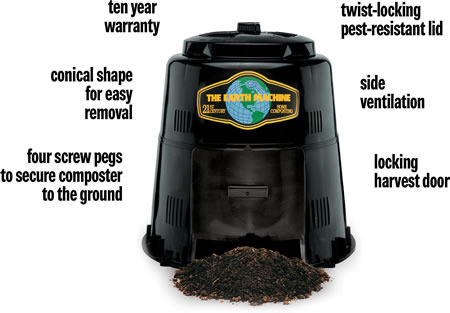How do I Make a Compost Pile?
In Newburyport you can compost by using an outdoor composter like The Earth Machine, sold at City Hall for $35 for residents (with proof of residency)/$45 for nonresidents, or make your own composter or subscribe to our curbside collection with Black Earth Compost.
What are the elements of a good compost pile?
- Bio-degraders – Nature provides an army of workers who specialize in decomposing organic material: bacteria, fungi, molds, earthworms, insects and other soil organisms eat all types of organic material, converting nutrients into plants food. The process of composting is simply a mater of providing the organisms with food, water and oxygen.
- Organic Material – Organic materials contain carbon and nitrogen that nourish organisms naturally present in your compost pile. Billions of organisms inhabit the surface of every leaf and blade of grass in your yard. Brown materials like autumn leaves are high in carbon; green materials like grass clippings are high in nitrogen.
- Recipe – Use three parts brown material to one part green material to optimize composting and prevent odors. This recipe will yield finished compost in three - eight months. Damp leaves alone break down in six to 15 months. Grass clippings and food scraps composted alone result in unpleasant odors as a result of excess nitrogen. Mix leaves, straw or shredded newspaper with green material, or let it dry until it turns brown before composting it alone.
- Air – Compost needs oxygen or the process slows and creates odors. Fluff and turn your pile regularly, with a hoe and build air passages into the pile with cornstalks.
- Moisture – Compost organisms need moisture. The pile should be as damp as a wrung out sponge, but not dripping wet. Wet leaves when adding because dry material will not break down. Moisture evaporates as the pile heats up – a sign of active composting. Let rain and snow replace it or add water during dry spells. A cover helps retain moisture.
How do I mulch with compost?
- Grass clippings, leaves and woody yard wastes can be used as mulch in the gardens and around shrubs.
- Mulching with compost keeps the soil moist, controls weed growth and adds nutrients.
- Use a mulch of pine needles around acid loving plants.
- Leaves work first as a mulch, then as soil enrichment as they decompose.Grass clippings should be dried before using as mulch.
- Do not mulch with grass clippings treated with herbicides. Composting them first will break down most of the herbicides.
Composting Without a Yard
- Composting can be done indoors using an earthworm farm. For more information, call DEP's Recycling Program at 617-292-5834.

| Attachment | Size |
|---|---|
| 49.31 KB | |
| 47.04 KB |

